
Coronary Artery Scan: What It Shows and Why It Matters for Prevention
Coronary Artery Scan: What It Shows, Who Needs It, and
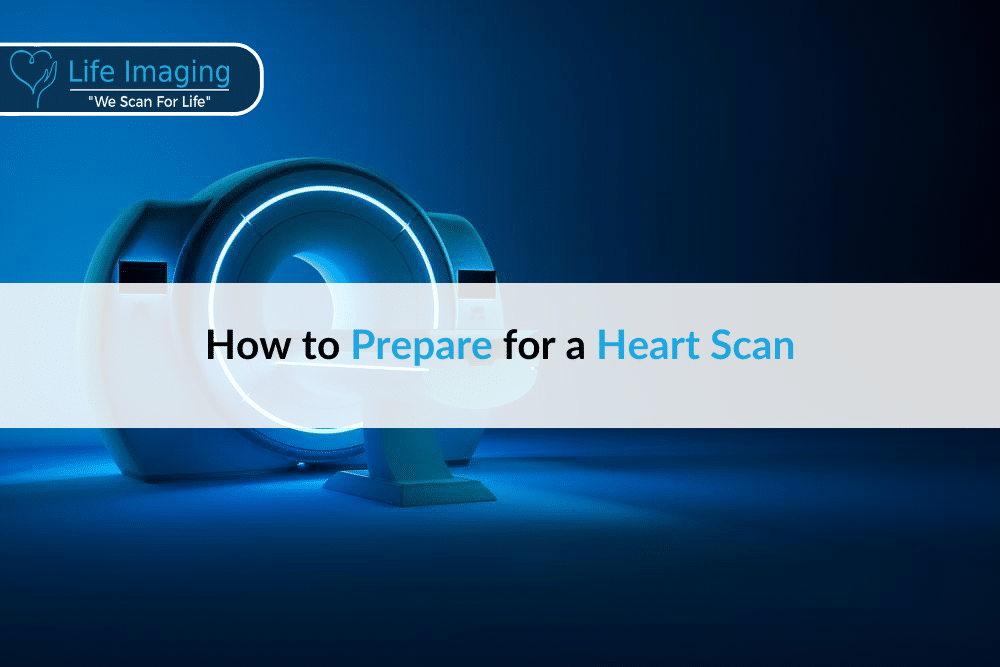
Taking care of your heart health is crucial in today’s fast-paced world. One effective way to monitor your heart health is through a heart scan. Whether you’re at risk for heart disease or simply taking preventative measures, preparing for a heart scan can seem daunting. At Life Imaging Fla, we specialize in the early detection of heart disease and cancer, providing state-of-the-art imaging services to ensure you receive accurate and timely results. Our Orlando-based center is dedicated to helping you take proactive steps toward maintaining your heart health.
In this article, we will guide you through everything you need to know about preparing for a heart scan. From understanding the different types of heart scans to knowing what to expect on the day of your appointment, we’ll cover all the essential information. Proper preparation can make a significant difference in the accuracy and effectiveness of your scan, so it’s important to follow the guidelines closely.
We’ll also discuss lifestyle adjustments you may need to make, any required preparatory steps, and what to do after your scan. By the end of this article, you’ll feel confident and well-prepared for your heart scan at Life Imaging Fla. Taking a proactive approach to your heart health is a critical step in ensuring long-term wellness. Let’s dive into the detailed steps and tips for preparing for a heart scan, ensuring you make the most out of your appointment.
Your heart health is of utmost importance, and a heart scan can provide valuable insights. Whether you’re undergoing a coronary calcium scan, CT angiography, or any other type of heart scan, proper preparation is key. Here are detailed guidelines to help you prepare effectively.
Before diving into the preparation steps, it’s crucial to understand the different types of heart scans available at Life Imaging Fla.
This scan measures the amount of calcium in the walls of your coronary arteries. High levels of calcium can indicate the presence of atherosclerosis, a major risk factor for heart disease. This scan is non-invasive and typically takes about 10-15 minutes to complete.
The coronary calcium scan uses CT imaging to produce detailed pictures of your heart. It helps to identify potential blockages or narrowing of the arteries due to plaque buildup.
CT Angiography provides detailed images of your blood vessels, helping to identify any blockages or abnormalities. This scan is particularly useful for patients at high risk of coronary artery disease. The use of contrast dye may be required to enhance the images.
CT Angiography is a more comprehensive scan that provides detailed images of the heart’s blood vessels. It can help diagnose various heart conditions and plan future treatments.
An echocardiogram uses sound waves to produce images of your heart. It helps assess the heart’s structure and function, and is often used to detect heart muscle damage or valve issues. This scan is non-invasive and takes about 30-60 minutes.
The echocardiogram is a versatile test that provides detailed information about your heart’s functionality. It can help in diagnosing various heart conditions and monitoring heart health over time.
Proper preparation can ensure that your heart scan is as accurate and effective as possible. Here are essential steps to follow:
Before scheduling your heart scan, consult with your healthcare provider to discuss your medical history, current medications, and any potential risks. This consultation helps determine the most appropriate type of heart scan for your needs.
Discussing your medical history with your healthcare provider ensures that the chosen scan is suitable for your specific health condition. It also helps in identifying any potential risks or complications.
For certain types of heart scans, especially those involving contrast dye, you may be required to fast for a few hours before the procedure. Follow your healthcare provider’s instructions regarding fasting and hydration.
Fasting helps ensure the accuracy of your scan results. Drinking enough water before the scan (if allowed) can improve the quality of the images.
Caffeine and nicotine can affect your heart rate and blood pressure, potentially impacting the accuracy of your scan. Avoid consuming caffeine and nicotine for at least 24 hours before your appointment.
Avoiding caffeine and nicotine helps maintain a stable heart rate and blood pressure, ensuring accurate scan results.
Wear loose, comfortable clothing to your appointment, as you may need to change into a hospital gown. Avoid wearing jewelry and metal objects, as they can interfere with the imaging process.
Choosing the right clothing ensures comfort and convenience during the scan. Avoiding jewelry and metal objects prevents any interference with the imaging equipment.
Arriving prepared on the day of your heart scan can help the process go smoothly. Here are some key tips:
Arrive at the imaging center at least 15-30 minutes before your scheduled appointment to complete any necessary paperwork and settle in.
Arriving early allows time for any administrative tasks and helps you feel less rushed and more relaxed before the scan.
Carefully follow any pre-scan instructions provided by your healthcare provider or the imaging center. These instructions may include fasting guidelines, medication adjustments, and other preparatory steps.
Adhering to pre-scan instructions ensures optimal scan accuracy and effectiveness. It also helps prevent any potential complications during the procedure.
Inform the technologist about any concerns or questions you have before the scan begins. Communicate any discomfort or anxiety you may feel to ensure a comfortable experience.
Effective communication with the technologist ensures you understand the procedure and feel at ease. Addressing any concerns beforehand helps create a smooth and stress-free experience.
During the heart scan, it’s important to remain as still as possible to obtain clear and accurate images. Follow the technologist’s instructions and try to relax.
Remaining still during the scan ensures high-quality images. Relaxation techniques, such as deep breathing, can help you stay calm and composed.
Once your heart scan is complete, there are a few steps to follow to ensure a smooth recovery and obtain accurate results.
Follow any post-scan guidelines provided by the technologist or healthcare provider. These may include instructions on resuming normal activities, eating, and taking medications.
Adhering to post-scan guidelines ensures a smooth recovery and accurate scan results. It helps you return to your daily routine without any complications.
Your healthcare provider will review the scan results and discuss them with you during a follow-up appointment. This discussion will help determine the next steps in your heart health management plan.
Discussing scan results with your healthcare provider ensures you understand the findings and any potential implications. It helps you make informed decisions about your heart health.
Based on the scan results, your healthcare provider may recommend lifestyle adjustments to improve your heart health. These adjustments may include changes to your diet, exercise routine, and medication regimen.
Implementing recommended lifestyle adjustments supports long-term heart health. It helps prevent potential heart issues and maintains overall well-being.
Maintaining a healthy lifestyle is essential for optimal heart health. Here are key lifestyle choices to support your heart:
Eating a balanced diet rich in fruits, vegetables, whole grains, and lean proteins supports heart health. Limit the intake of saturated fats, trans fats, and sodium to reduce the risk of heart disease.
A balanced diet provides essential nutrients for heart health. Making healthy food choices helps maintain a healthy weight and reduces the risk of heart disease.
Engage in regular physical activity to strengthen your heart and improve overall cardiovascular health. Aim for at least 150 minutes of moderate aerobic exercise or 75 minutes of vigorous activity each week.
Regular exercise promotes heart health and overall well-being. Incorporating physical activity into your routine helps maintain a healthy heart and reduces the risk of cardiovascular diseases.
Smoking is a significant risk factor for heart disease. If you smoke, seek support to quit and avoid exposure to secondhand smoke.
Avoiding smoking supports heart health and reduces the risk of heart disease. Seeking resources and support can help you quit smoking effectively.
Chronic stress can negatively impact your heart health. Practice stress management techniques, such as meditation, yoga, and deep breathing exercises, to reduce stress levels.
Managing stress supports overall well-being and heart health. Incorporating relaxation techniques into your routine helps reduce the risk of heart issues.
Knowing the risk factors for heart disease helps you take proactive steps to protect your heart. Here are some common risk factors:
A family history of heart disease increases your risk. Inform your healthcare provider about any family history of cardiovascular conditions.
Understanding your family history helps assess your heart disease risk. Sharing this information with your healthcare provider supports personalized care and prevention strategies.
Age and gender play a role in heart disease risk. Men are at higher risk at a younger age, while women’s risk increases after menopause.
Recognizing age and gender-related risks helps tailor your heart health management plan. Monitoring and preventive measures support long-term heart health.
High blood pressure, or hypertension, strains the heart and increases the risk of heart disease. Regularly monitor your blood pressure and follow your healthcare provider’s recommendations.
Managing blood pressure supports heart health and reduces the risk of cardiovascular diseases. Regular check-ups and lifestyle adjustments help maintain healthy blood pressure levels.
Elevated cholesterol levels contribute to plaque buildup in the arteries. Monitor your cholesterol levels through regular blood tests and follow a heart-healthy diet.
Managing cholesterol levels supports heart health and reduces the risk of plaque buildup. Adhering to dietary recommendations helps maintain optimal cholesterol levels.
Scheduling a heart scan is a crucial step in proactive heart health management. Here’s how to schedule your scan at Life Imaging Fla:
Reach out to Life Imaging Fla to schedule your heart scan. Our knowledgeable team will guide you through the scheduling process and provide any necessary information.
Contacting Life Imaging Fla ensures a smooth scheduling process. Our team is ready to assist you with any questions and provide detailed information about the scan.
Discuss insurance coverage and payment options with our team. Understanding your insurance benefits and available payment plans helps you make informed decisions about your heart scan.
Discussing insurance and payment options ensures transparency and clarity. It helps you understand your financial responsibilities and available resources.
Once your appointment is scheduled, follow the preparation steps outlined in this article. Proper preparation ensures an accurate and effective heart scan.
Preparing for your visit ensures a smooth and successful heart scan. Following the guidelines helps optimize scan accuracy and overall experience.
Understanding common questions about heart scans helps you feel more confident and informed. Here are some frequently asked questions:
A heart scan is a non-invasive imaging test that provides detailed pictures of your heart. It helps detect potential issues, such as blockages or calcium buildup in the arteries.
Understanding what a heart scan is helps you know what to expect. It provides valuable insights into your heart health and potential risks.
The duration of a heart scan varies depending on the type of scan. Most scans take between 10 to 60 minutes to complete.
Knowing the scan duration helps you plan your day accordingly. It ensures you allocate enough time for the appointment and any necessary preparations.
Heart scans are generally painless. Some scans may involve brief discomfort due to positioning or the use of contrast dye.
Understanding that heart scans are generally painless helps alleviate any anxiety. Knowing what to expect helps create a more comfortable experience.
The frequency of heart scans depends on your individual risk factors and healthcare provider’s recommendations. Regular screenings may be necessary for those at higher risk of heart disease.
Knowing the recommended frequency of heart scans helps you stay proactive about your heart health. Regular screenings support early detection and prevention.
Early detection of heart disease offers numerous benefits, including:
Early detection allows for timely intervention and treatment. It helps prevent the progression of heart disease and reduces the risk of complications.
Timely intervention supports better treatment outcomes. Early detection and treatment help maintain optimal heart health and prevent severe conditions.
Identifying heart health issues early enables personalized care and tailored treatment plans. Your healthcare provider can develop a plan that addresses your specific needs.
Personalized care supports effective management and treatment. It ensures that your heart health management plan is suited to your individual condition.
Knowing your heart health status provides peace of mind. It helps you take proactive steps to protect your heart and overall well-being.
Peace of mind supports overall well-being and mental health. Knowing your heart health status allows you to make informed decisions about your care.
Heart scans are crucial for monitoring heart health. They help detect heart disease early, which can be life-saving. Different types of heart scans provide detailed images of your heart and blood vessels. This information helps doctors diagnose and treat heart problems effectively. Preparing well for these scans ensures accurate results, so it’s important to understand the process.
Each heart scan offers unique insights into your heart’s health. Knowing what each scan does can help you prepare better.
A coronary calcium scan measures calcium in the walls of your coronary arteries. High levels of calcium can indicate a risk of heart disease. This scan is quick and non-invasive, usually taking about 10-15 minutes.
CT angiography provides detailed images of your blood vessels to identify blockages or abnormalities. It’s useful for people at high risk of coronary artery disease. This scan may require a contrast dye, which helps get clearer images of your blood vessels.
Preparation is key to getting accurate results. Here’s what you need to do:
Before scheduling your heart scan, have a consultation with your healthcare provider. Discuss your medical history, current medications, and any potential risks. This helps you choose the right type of heart scan.
Some heart scans may need you to fast for a few hours beforehand. Your doctor will give specific instructions. Fasting helps ensure the scan results are accurate. Drinking water, if allowed, can also improve image quality.
Caffeine and nicotine can affect your heart rate and blood pressure, making it harder to get accurate results. Avoid consuming them for at least 24 hours before your scan.
On the day of your scan, wear loose, comfortable clothes. You may need to change into a hospital gown. Avoid wearing jewelry and metal objects; they can interfere with the imaging process.
Knowing what to expect can make the experience less stressful and more efficient:
Arrive at the imaging center at least 15-30 minutes before your appointment. This gives you time to fill out any needed paperwork and get settled.
Follow any pre-scan instructions from your healthcare provider. These might include guidelines about fasting and medication adjustments. Sticking to these instructions ensures your scan will be accurate and effective.
Before the scan starts, talk to the technologist about any concerns. If you feel anxious, let them know. Clear communication can ensure a more comfortable experience.
It’s important to stay still during the scan to get clear images of your heart. Relax and follow the technologist’s instructions.
After your scan, there are several steps to take:
Follow any guidelines given by the technologist or healthcare provider. These may include instructions about resuming normal activities, eating, and taking any medications.
Your healthcare provider will review your scan results with you. This follow-up discussion helps determine the next steps in managing your heart health.
Making healthy lifestyle choices can greatly benefit your heart health:
Eating a balanced diet rich in fruits, vegetables, whole grains, and lean proteins supports heart health. Limit foods high in saturated fats and salt.
Regular exercise can strengthen your heart and improve your overall cardiovascular health. Aim for at least 150 minutes of moderate aerobic exercise each week.
Smoking significantly increases your risk of heart disease. If you smoke, find support to quit. Avoid exposure to secondhand smoke as well.
Chronic stress can affect your heart health. Practice stress management techniques like meditation or yoga to reduce your stress levels.
Knowing the risk factors for heart disease can help you take preventative steps:
If you have a family history of heart disease, you could be at higher risk. Inform your healthcare provider to get personalized care.
High blood pressure can strain your heart and increase the risk of heart disease. Regularly monitor your blood pressure and follow your doctor’s recommendations.
High levels of cholesterol can lead to plaque buildup in your arteries. Regular blood tests help monitor cholesterol levels.
To schedule a heart scan, you need to follow a few simple steps:
Reach out to the imaging center to schedule your heart scan. Their team will guide you through the process and provide the necessary information.
Discuss insurance coverage and payment options with the team. Understanding your benefits and available payment plans will help you make informed decisions.
Once your appointment is scheduled, follow all the preparation steps to ensure an accurate and effective heart scan. Proper preparation makes the process smoother and more efficient.
Here are some common questions people have about heart scans:
A heart scan is a non-invasive test that provides detailed images of your heart. It helps detect issues like blockages and calcium buildup.
Most heart scans take between 10 to 60 minutes, depending on the type of scan.
Heart scans are generally painless. Some scans may involve brief discomfort due to positioning or the use of contrast dye.
How often you need a heart scan depends on your risk factors and your healthcare provider’s recommendations. Regular screenings might be necessary for those at higher risk.
Detecting heart problems early has many advantages:
Early detection allows for timely intervention and treatment, reducing the risk of complications.
Early detection helps tailor treatment plans to your specific needs.
Knowing your heart health status offers peace of mind, helping you take proactive steps to protect your health.
Remember, taking care of your heart is essential for a long, healthy life. Preparation is crucial for ensuring accurate results from your heart scan. Follow these steps to make your experience smooth and beneficial.
Deciding when to get a heart scan can depend on several factors. These factors help you and your healthcare provider make an informed decision.
Symptoms of Heart Disease
Certain symptoms may prompt your doctor to recommend a heart scan. These include chest pain, shortness of breath, palpitations, or unusual fatigue. If you experience these symptoms, consult your doctor to find out if a heart scan is right for you.
Age and gender play roles in determining heart disease risk. Men over 45 and women over 55 have higher risks. Your doctor may recommend a heart scan based on your age and gender, especially if you have other risk factors.
Pre-existing conditions like diabetes, high cholesterol, and hypertension can increase your risk of heart disease. If you have these conditions, a heart scan can help monitor your heart health.
Regular heart scans offer multiple benefits. These benefits help you maintain optimal heart health over time.
Regular scans help detect heart problems early. Early detection allows for timely treatment and can prevent serious complications.
If you are undergoing treatment for heart disease, regular scans help monitor your progress. They provide valuable information on how well your treatment is working.
Knowing the status of your heart health provides peace of mind. Regular scans help you stay informed and take proactive steps to maintain a healthy heart.
Orlando: A Hub for Advanced Heart Scans
Orlando offers many advanced heart scan options. The city is renowned for its state-of-the-art medical facilities and experienced healthcare professionals.
Top Medical Centers
Orlando is home to several top medical centers that provide high-quality heart scan services. These centers are equipped with the latest technology to ensure accurate and reliable results.
Experienced Healthcare Providers
The city boasts experienced healthcare providers specializing in heart health. These professionals are well-trained in performing and interpreting heart scans, ensuring you receive the best care possible.
Many facilities in Orlando offer flexible scheduling options. This makes it easier for you to book an appointment that fits your busy lifestyle.
Having questions about heart scans is natural. Here are answers to some commonly asked questions to help you understand the process better.
During a heart scan, you will lie on a table while a scanner takes images of your heart. The procedure is usually painless and may involve using a contrast dye for better images.
Preparation may include fasting, avoiding caffeine and nicotine, and wearing comfortable clothes. Follow your healthcare provider’s specific instructions to ensure accurate results.
You will typically receive your heart scan results within a few days. Your healthcare provider will discuss the findings with you and recommend next steps if needed.
Heart scans are generally safe. Some scans using contrast dye may pose minimal risks, such as allergic reactions. Discuss any concerns with your healthcare provider before the scan.
Understanding your heart scan results is crucial. Your healthcare provider will help you interpret the findings and what they mean for your heart health.
Results from heart scans may reveal calcium levels, blockages, or other abnormalities. These findings help your doctor diagnose and recommend appropriate treatments.
Have an open discussion with your doctor about the results. Ask questions to understand what the findings mean and what steps you should take next.
Based on your results, your doctor may recommend lifestyle changes, medications, or further tests. Follow their advice to maintain or improve your heart health.
Making lifestyle changes supports your heart health effectively. These changes help reduce risk factors and promote a healthy heart.
Choose a diet rich in fruits, vegetables, lean proteins, and whole grains. Avoid foods high in saturated fats, sugars, and salt. Balanced eating promotes a healthy heart.
Exercise helps strengthen the heart. Aim for at least 30 minutes of moderate exercise most days of the week. Activities like walking, cycling, and swimming are great options.
Avoid smoking and limit alcohol consumption. Both habits can negatively impact heart health. Seek support to quit smoking and adopt healthier habits.
Chronic stress can hurt your heart. Practice relaxation techniques such as deep breathing, meditation, or yoga. Managing stress helps maintain heart health.
Genetics plays a significant role in determining heart disease risk. Understanding this role helps you take preventive measures.
A family history of heart disease increases your risk. Inform your healthcare provider about any cases of heart disease in your family. They may recommend more frequent screenings.
Genetic testing can identify specific risk factors for heart disease. Consult your doctor to determine if genetic testing is suitable for you. The information can guide preventive measures and treatments.
Orlando is known for cutting-edge heart scan technologies. These technologies provide accurate and detailed images of your heart.
New 3D imaging techniques offer a detailed view of your heart and blood vessels. These images help doctors detect even minor abnormalities.
Some medical centers in Orlando use artificial intelligence (AI) to enhance diagnostic accuracy. AI helps interpret scan results quickly and accurately.
Many heart scans in Orlando use non-invasive methods. Non-invasive scans reduce discomfort and lower the risk of complications.
Accurate heart scans are essential for proper diagnosis and treatment. Here’s how to ensure you get accurate results.
Select a reputable medical center with advanced technology and experienced staff. This ensures you receive high-quality care and accurate results.
Adhere to all preparation instructions given by your healthcare provider. Proper preparation helps improve the accuracy of your heart scan.
Keep your doctor informed about any symptoms, medications, or changes in your health. Clear communication helps tailor the scan to your specific needs.
Understanding heart scans is crucial for maintaining good heart health. Knowing when to get a scan, how to prepare, and what to expect can make the process smoother and more effective. Taking proactive steps and making informed decisions can help ensure accurate results and better heart health outcomes.
Being emotionally and mentally prepared for a heart scan can make the experience less stressful. Here are ways to prepare yourself:
Learn about the heart scan procedure ahead of time. Knowing what to expect can reduce anxiety. Ask your healthcare provider to explain the process and what each part of the scan entails.
Practicing relaxation techniques can help calm your nerves. Deep breathing exercises, meditation, and listening to soothing music are effective ways to relax. Try these techniques before and during the scan to stay calm.
Having a support system can make a big difference. Consider bringing a friend or family member with you to the appointment. Their presence can provide comfort and reassurance.
Understanding costs and insurance coverage is important for planning your heart scan. Here’s what you need to know:
The cost of a heart scan can vary depending on the type of scan and the facility. It’s important to get an estimate of the costs before scheduling your appointment. Ask the imaging center or your healthcare provider for a detailed breakdown.
Many insurance plans cover heart scans, especially if they are deemed medically necessary. Check with your insurance provider to understand your coverage options. They can inform you about any out-of-pocket expenses you might incur.
Most imaging centers offer various payment options, including payment plans and financial assistance programs. Discuss these options with the billing department to find a solution that works for you.
Follow-up care is crucial for managing your heart health after a scan. Here’s why follow-up care matters:
After your heart scan, it’s important to discuss the results with your healthcare provider. They can interpret the findings and explain what they mean for your heart health.
Based on the scan results, your doctor may recommend a treatment plan. This could include lifestyle changes, medications, or further tests. Following the recommended treatment plan is essential for managing any heart conditions.
Regular monitoring and follow-up visits help ensure your heart remains healthy. Your doctor may schedule additional scans or check-ups to track your progress over time.
Selecting the right healthcare provider ensures you get the best care. Here are tips for choosing a provider:
Research local healthcare providers who specialize in heart care. Look for reviews and testimonials from other patients. Positive feedback can help you find a trusted provider.
Check the credentials and experience of the healthcare provider. Make sure they are board-certified and have experience in performing and interpreting heart scans.
Personal comfort with your healthcare provider is important. Choose a provider you feel comfortable discussing your heart health with and asking questions.
Advancements in technology have improved the accuracy of heart scans. Here are some innovative technologies used in Orlando:
High-resolution imaging provides detailed pictures of your heart and blood vessels. This technology helps detect even the smallest abnormalities.
Artificial intelligence (AI) assists in diagnosing heart conditions. AI algorithms analyze scan images quickly and accurately, improving diagnostic precision.
Many heart scans in Orlando use non-invasive techniques. These methods provide accurate results without the need for surgical procedures.
In addition to heart scans, there are other diagnostic tools for assessing heart health. These alternatives offer different insights:
An electrocardiogram records the electrical activity of your heart. It helps detect irregular heartbeats, heart attacks, and other conditions. The test is quick and painless.
Stress tests measure your heart’s performance under physical exertion. You may walk on a treadmill or ride a stationary bike while your heart rate, blood pressure, and breathing are monitored.
Blood tests can provide valuable information about your heart health. They measure levels of cholesterol, triglycerides, and other markers that indicate heart disease risk.
There are many myths about heart scans. Understanding the facts can help you make informed decisions:
Fact: Heart scans are generally painless. Some scans use contrast dye, which may cause minor discomfort, but the procedures are mostly non-invasive and comfortable.
Fact: Heart scans can be useful for people of all ages, especially those with risk factors like high blood pressure, diabetes, or a family history of heart disease.
Fact: While some heart scans can be costly, many insurance plans cover them. Financial assistance and payment plans are also available to help manage costs.
Preparing for future heart scans helps ensure you continue to monitor your heart health effectively. Here’s how to prepare:
Schedule regular check-ups with your healthcare provider. Keeping up with appointments allows for ongoing monitoring and early detection of any issues.
Continue making healthy lifestyle choices to support heart health. Regular exercise, balanced eating, and avoiding harmful habits are key to maintaining a healthy heart.
Stay informed about new advancements in heart health and imaging technology. Knowledge can help you make better decisions about your heart care.
Orlando offers various heart scan options. Each option provides unique benefits:
Calcium scoring measures the amount of calcium in your coronary arteries. High scores indicate a higher risk of coronary artery disease. This scan helps in early detection and prevention.
CT coronary angiography provides detailed images of your coronary arteries. It helps identify blockages and other abnormalities. This scan is useful for diagnosing coronary artery disease.
Cardiac MRI uses magnetic resonance imaging to create detailed pictures of your heart. This scan helps assess heart muscle function, valves, and blood flow. It’s useful for diagnosing various heart conditions.
Asking questions helps you understand the process and make informed decisions. Here are some questions to consider:
Discuss with your healthcare provider which type of heart scan is best suited for your needs. They can explain the benefits and limitations of each option.
Ask about any specific preparation steps you need to take. Understanding these steps ensures accurate results and a smooth experience.
Understand what information you can expect from the scan results. Your healthcare provider can explain how the findings will guide your treatment or care plan.
Inquire about any potential risks associated with the heart scan. Knowing the risks helps you weigh the benefits and make informed choices.
Scheduling and follow-up are critical for effective heart care. Here’s what to do:
Contact the imaging center or your healthcare provider to schedule your heart scan. Confirm the date, time, and any special instructions.
Plan for follow-up appointments to discuss your scan results. Regular follow-up helps ensure your heart health remains a priority.
FAQs provide quick answers to common questions and concerns:
Q: How Long Does a Heart Scan Take?
A: Most heart scans take between 10 to 60 minutes, depending on the type of scan.
Q: Is There Any Discomfort During the Scan?
A: Heart scans are generally painless. Some may involve brief discomfort due to positioning or the use of contrast dye.
Q: Do I Need a Referral for a Heart Scan?
A: It depends on your insurance and healthcare provider. Check with your provider to see if a referral is required.
Understanding the different aspects of heart scans helps you make informed decisions about your heart health. Preparing for your scan, knowing what to expect, and following up with your healthcare provider ensures you receive accurate results and effective care. Taking these steps improves your overall heart health and well-being.
Taking proactive steps to monitor your heart health is crucial for a long and healthy life. Heart scans provide a detailed look into the condition of your heart, helping to catch potential issues early. Whether you are experiencing symptoms or managing pre-existing conditions, a heart scan can offer peace of mind and guide effective treatment.
In Orlando, advanced medical facilities and experienced healthcare providers are ready to assist you with state-of-the-art heart scan services. These facilities utilize the latest technology to ensure accurate and detailed imaging, allowing for precise diagnoses and treatment plans. By choosing the right providers and staying informed about the process, you can take control of your heart health effectively.
Don’t wait until symptoms worsen. Early detection through regular heart scans enables you to take preventive measures, improving your quality of life. Embrace a future with better heart health by making informed decisions today.
If you are ready to prioritize your heart health, consider scheduling a heart scan at Life Imaging Fla. Our experienced professionals use cutting-edge technology to deliver accurate and reliable results. Visit our website or contact us to book your appointment and take the first step towards a healthier heart.
Secure your well-being and ensure your heart health today. Schedule your heart scan with Life Imaging Fla and take control of your cardiovascular health.

Coronary Artery Scan: What It Shows, Who Needs It, and
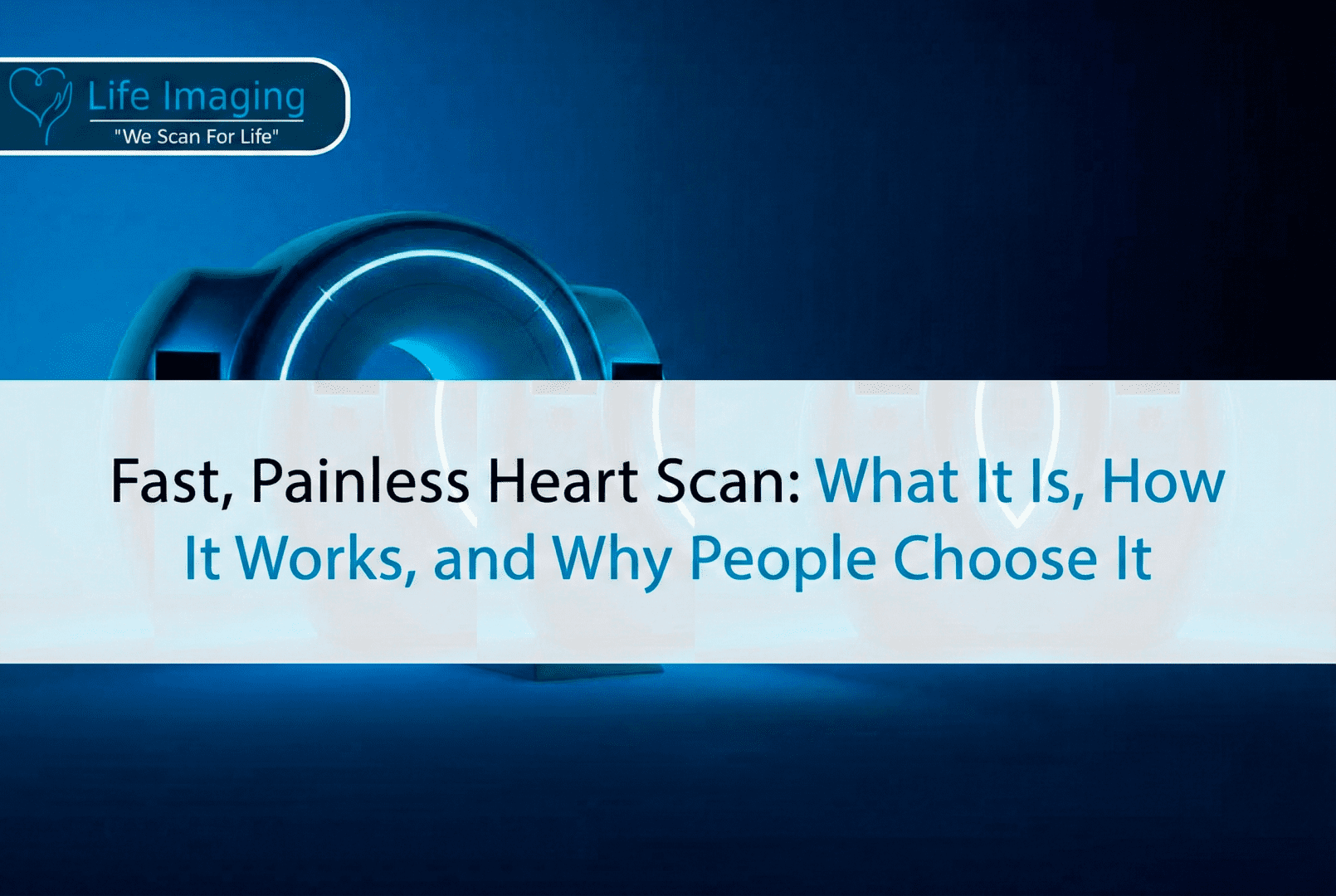
Fast and Painless Cancer Scan: What It Really Means PREVENTIVE
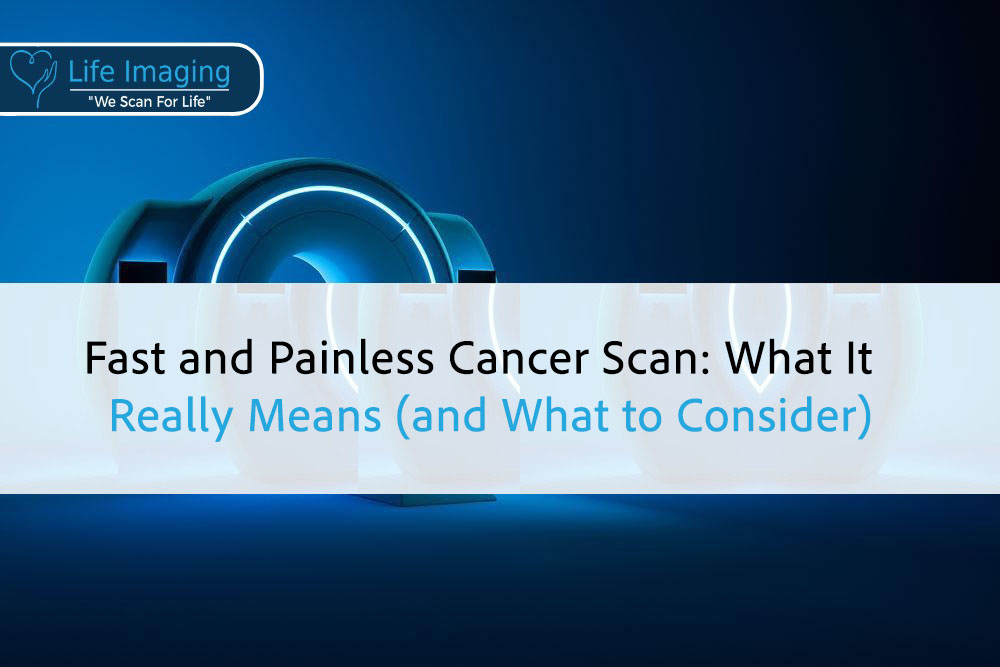
Fast and Painless Cancer Scan: What It Really Means (and
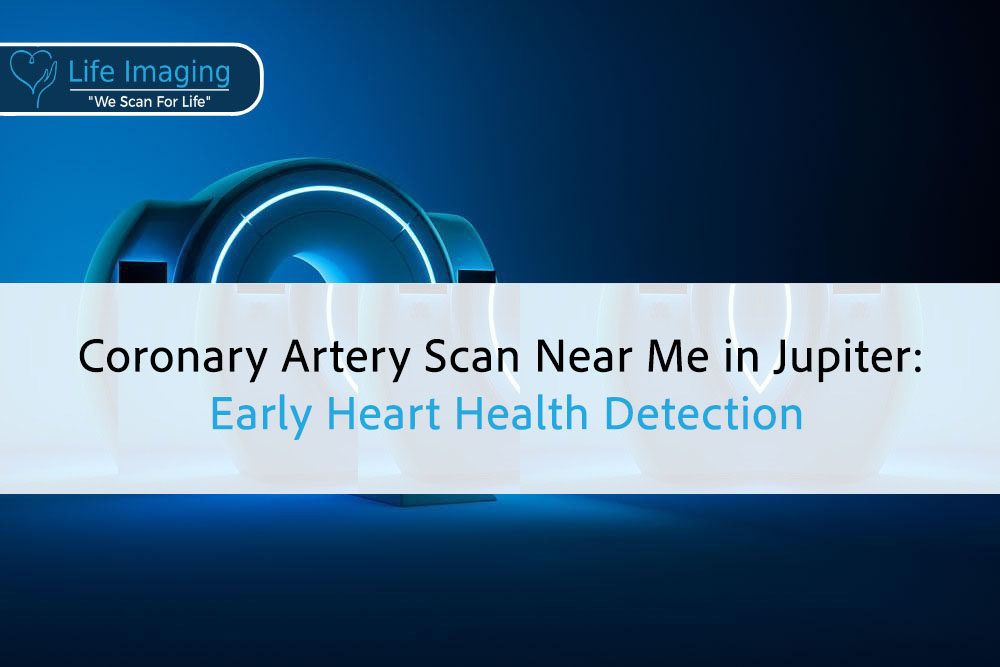
Introduction Your heart works hard every second of the day,
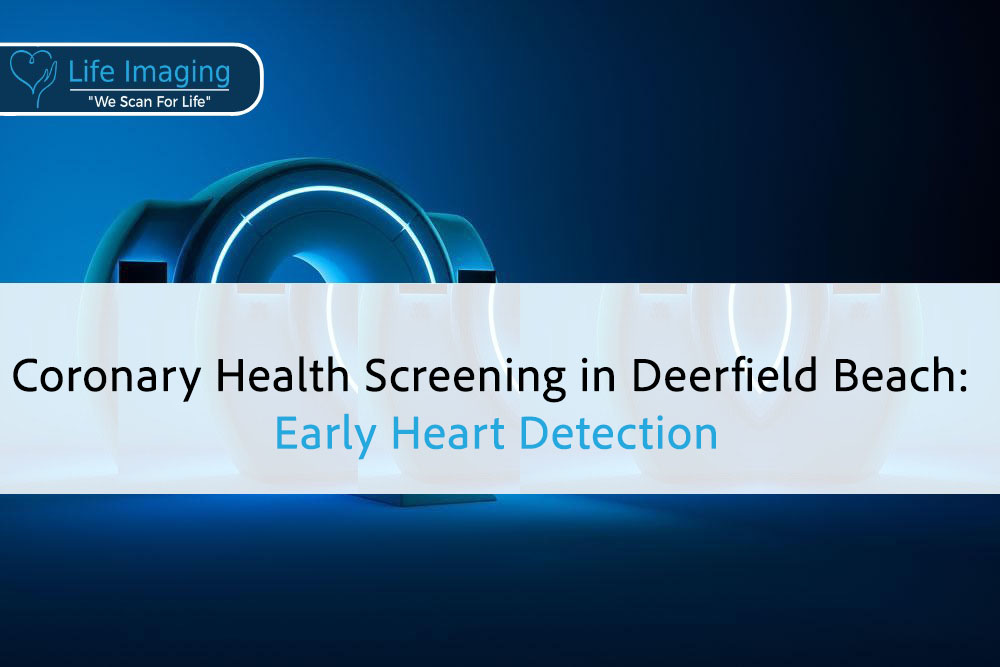
Introduction Your heart works around the clock, but changes inside
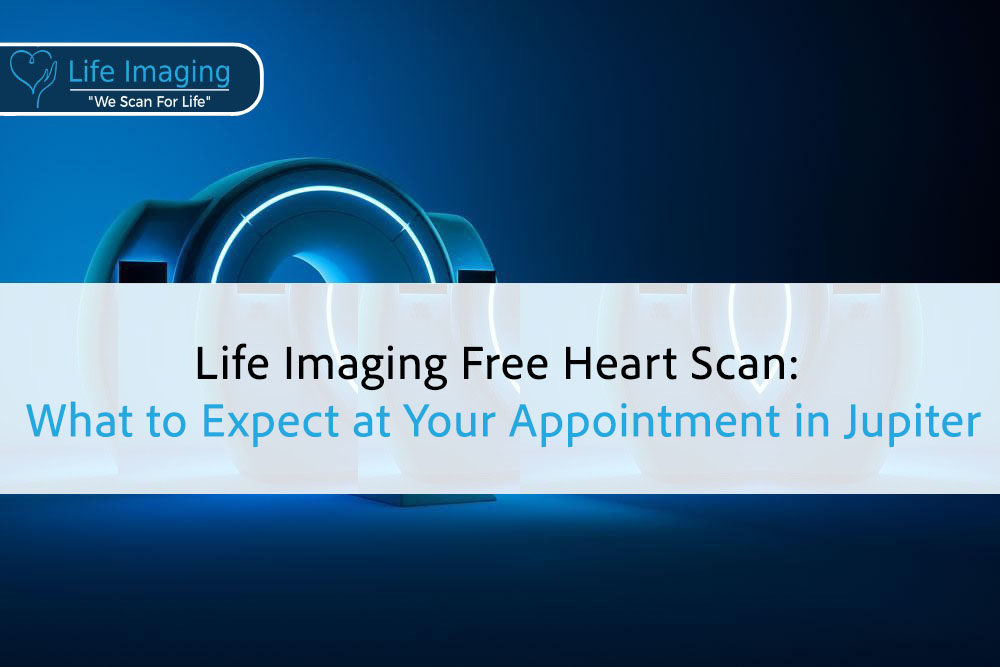
Introduction Your heart works nonstop, often without a single complaint.

* Get your free heart scan by confirming a few minimum requirements.
Our team will verify that you qualify before your scan is booked.
Copyright © 2025 Life Imaging – All Rights Reserved